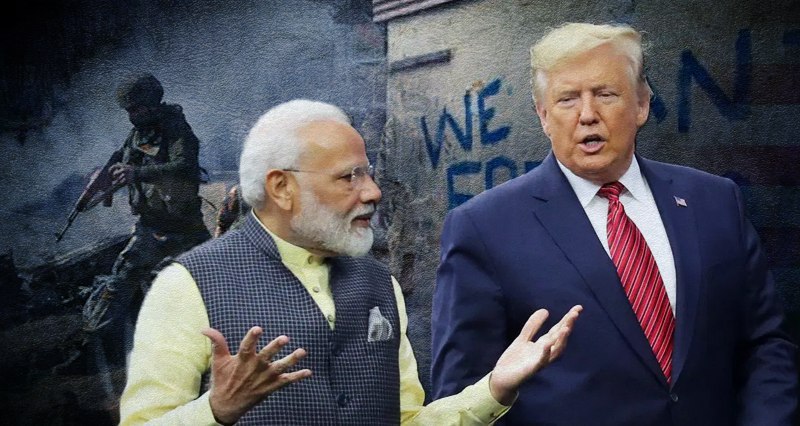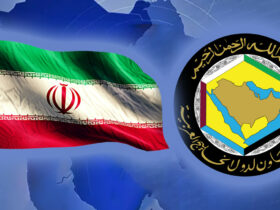US President Donald Trump and his family met with Indian Prime Minister Narendra Modi in India, went sightseeing and took pictures against the backdrop of the Taj Mahal and the cricket field in Gujarat. Meanwhile, bloody clashes between Muslims and Hindus took place across the country. While the leaders talked about joint commitment to fight radical Islamism, fierce battles between opposing religious camps took place in the streets of the Indian capital.
The details of the clashes
At least 23 people died in protests against the new citizenship law in the Indian capital, New Delhi, and around 190 were injured.
The spike in violence in New Delhi began with a clash between Hindus and Muslim protesters. Muslims have been protesting a new law which they believe discriminates against them on religious grounds.
One of the Muslim community’s claims is that the police did not stop these acts of violence, and perhaps even encouraged them. According to media reports, law enforcement officers stood by and watched while cars were being burned and pummeled with stones. The apotheosis of the confrontation was the storming of a mosque from which the loudspeaker was removed and a flag with the image of the Hindu deity Hanuman was hung.
A video of the attack on the mosque quickly went viral:
The meaning of religious law
There are about 200 million Muslims living in India, making the topic of religious contradiction pressing and painful. Modi himself holds strongly nationalist beliefs, and so the religious reform itself was no big surprise… Nonetheless, the massive wave of resentment it caused was unexpected.
The protests against the Citizenship Act, which provides simplified naturalization for non-Muslim immigrants from neighbouring countries, have been ongoing for weeks.
Allusion to the events of 2002
During their meeting, the leaders discussed the new law which prompted the protests. Trump was very friendly to Modi and did not condemn the law, noting in a comment to journalists that he prefers to leave the decision to India. He expressed hope that the powers that be will make the right decision.
Trump didn’t forget to remind everyone that the United States and India are in a joint fight against “radical Islamic terrorism”.
Both leaders came to power on anti-Muslim platforms: Modi on Hindu nationalism, and Trump as a result of his strong commitment to Israel. At one point, Modi was even banned from entering the US after he failed to prevent riots in 2002 which resulted in the death of hundreds of Muslims. Many journalists compared what happened on Indian streets during Trump’s visit to what happened in 2002.
India’s foreign policy under Modi has become strongly pro-American with a Zionist tinge. For example, Sandeep Chakravorty, India’s consul general to the US, has advocated for Israel-like settlements for Kashmiri Hindus.
In a long video posted online, he compares the situation of Kashmiri Hindus with that of Israel, saying that if the Israeli people can do it, it’s possible to do the same in Kashmir.
A senior Indian diplomat has sparked anger by calling for the adoption of an “Israeli model” in Indian-administered Kashmir.
Read more on the story here: https://t.co/lkI7jqHl2C pic.twitter.com/w8hXOJVGM7
— Al Jazeera English (@AJEnglish) November 28, 2019
The video inspired an extremely negative reaction from the public.
Kashmiri novelist and journalist Mirza Waheed told Al Jazeera that this kind of comparison “cannot have any other meaning but an endorsement of a settler-colonial project.”
Even Pakistan’s Prime Minister Imran Khan shared the Middle East Eye article on Twitter arguing that Chakravorty’s opinion reflects “the fascist mindset of the Indian government.”
Shows the fascist mindset of the Indian govt’s RSS ideology that has continued the siege of IOJK for over 100 days, subjecting Kashmiris to the worst violation of their human rights while the powerful countries remain silent bec of their trading interests. https://t.co/ESZiaVp563
— Imran Khan (@ImranKhanPTI) November 27, 2019
How long will the world remain silent while the fascist extremist Modi regime indulges in state terrorism? https://t.co/GbIzHtEUlq
— Imran Khan (@ImranKhanPTI) January 3, 2020
This is largely due to the Islamophobia of the Bharatiya Janata Party (BJP) as well as the pro-Israeli position of the Hindutva ideologists. The BJP was founded in 1980 as a political project which explicitly sought “Hindutva” (Hindu power).
Vinayak Damodar Savarkar, another ideologue who helped shape Hindutva wrote: “If we Hindus grow stronger in India, the Muslim friends of the League type will have to play the part of German-Jews instead.”
Another historical example is Madhav Sadashiv Golwalkar (1906-73) who wrote in the late 1930s the following: “The Jews had maintained their race, religion, culture and language, and all they wanted was their natural territory to complete their nationality.”
Trump’s gestures toward Israel have become a consistent line in recent years, as shown in the recognition of Jerusalem as Israeli, statements about the Golan Heights, the proposal for the so-called “deal of the century” for Palestine and the constant clashes with the new “face of Islam” in the US Senate and with figures like Ilhan Omar. The apotheosis of Trump’s contemptuous attitude towards Islam was the order to kill the Iranian general of the IRGC Qassem Soleimani. This is largely why Trump is so popular with Indian nationalists, who have even built statues in his honor.
As we noted earlier, Trump’s geopolitical logic is that it is more profitable to aggravate the situation in Kashmir as a part of broader anti-Chinese measures, as the northern part of the region (Pakistan) is involved in CPEC (a joint economic project of China and Pakistan). If war breaks out in Kashmir, the Chinese project will be suspended.
It is in the globalist interests of the US not only to weaken Pakistan and aggravate the contradictions of its neighbors, but also to weaken India itself from within. Fueling anti-Muslim conflicts will distance India from the Muslim world and weaken it as a potentially powerful pole in a multipolar world. A strong and sovereign India is disadvantageous to the US.
Provoking Hindu-Muslim conflicts is ultimately beneficial to the US and Israel. India itself only loses credibility in the international arena, being seen more and more as a “Zionist puppet.”
Organisations like Overseas Friends of the Bharatiya Janata Party (BJP), the US chapter of the Rashtriya Swayamsevak Sangh (RSS), the Vishwa Hindu Parishad of America (VHP World Hindu Council) and the Friends of India Society International (FISI), are all powerful lobbies in US politics, which is another likely factor in the US’ decision making.
For India to obtain sovereignty and play a role in the fight for a multipolar world, it must fight alongside Muslims rather than against them.

















Leave a Reply